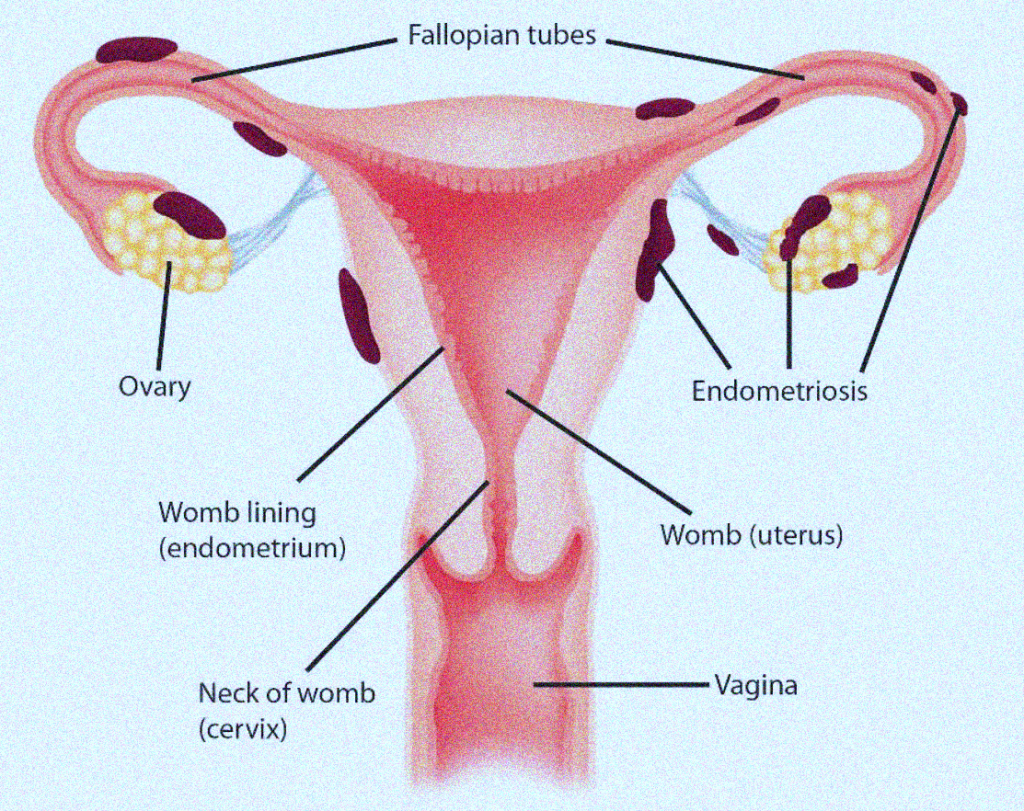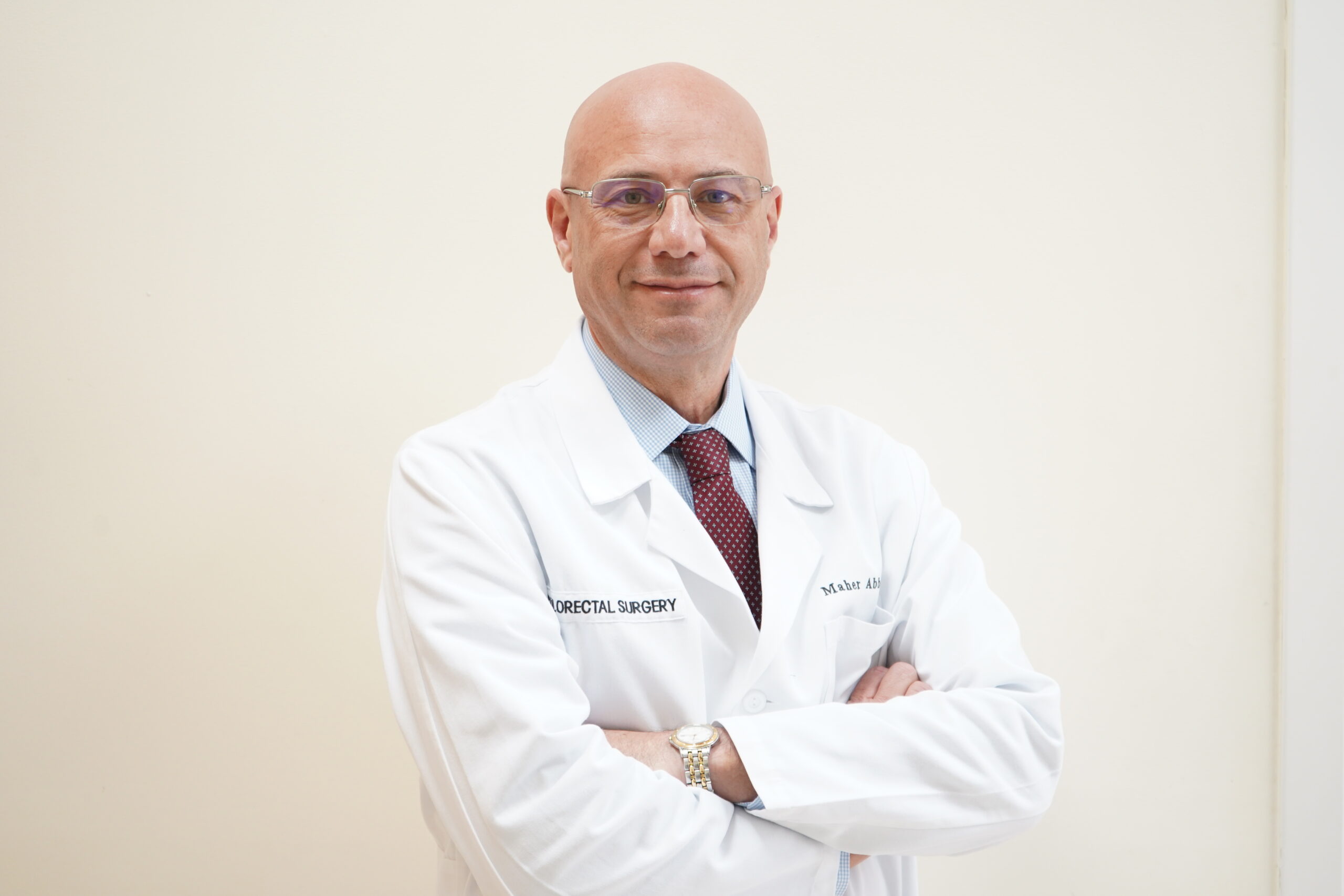What is endometriosis?
Endometriosis is a condition in which the endometrial tissue, which normally lines the inside of the uterus, grows on organs outside the uterus. The implants of abnormal tissue are most often found on the ovaries, the fallopian tubes, the outer walls of the uterus, and the large bowel (colon and rectum) [Figure 1]. Rarely endometriosis can affect organs outside the abdomen and pelvis.

Figure 1 – Endometriosis implants on various parts of the female gynecologic organs
Endometrial tissue implants respond to the female hormone, estrogen. During the menstrual cycle, the implants grow in size like the lining of the uterus or become thicker and inflamed which causes bleeding.
The blood from implants cannot flow out of the body and causes the surrounding tissue to become inflamed and swollen. The bleeding, inflammation, and scarring cause pain, especially before and during menstruation.
What are the risk factors for endometriosis?
Endometriosis is mostly a disease of women of reproductive age. The symptoms usually develop a few years after the onset of menstruation. Endometriosis symptoms cease temporarily during pregnancy and typically end with menopause unless the patient is taking estrogen supplements. Several risk factors increase the chances of developing endometriosis. They include the following:
- Alcohol consumption
- Conditions which prevents the normal flow of menstrual blood out of the body
- Family history of endometriosis in several female relatives
- High levels of estrogen
- Low body mass index
- Menopause at an older age
- Never having a baby
- Onset of a period at an early age
- Short and more frequent menstrual cycles
- Some uterus abnormalities
What are the symptoms of endometriosis?
Women with endometriosis can experience one or more of the following symptoms:
- Abdominal and pelvic pain (severe and starts a few days before the menstrual period)
- Bloating and abdominal distention
- Constipation or diarrhea
- Difficulty with bowel movements
- Fatigue
- Heavy bleeding during periods
- Infertility
- Lower back pain
- Nausea
- Painful bowel movements
- Painful sexual intercourse
- Painful urination
How is endometriosis diagnosed?
The history provided by the patient can be very helpful when suspecting the diagnosis of endometriosis. An office based pelvic examination is conducted to assess the vagina, uterus, ovaries, and rectum. An ultrasound examination and/or a magnetic imaging resonance scan (MRI) is advisable to image the pelvic organs. Colonoscopy is recommended in patient over 40 years of age and those with severe symptoms such as diarrhea or painful defecation. In some patients, a surgical procedure called diagnostic laparoscopy may be necessary to establish the diagnosis. During this procedure, the surgeon inserts a thin camera through a small incision around the belly button and inspects the pelvic organs for any evidence of endometriosis.
How is endometriosis treated?
Medical therapy
In most patients with endometriosis, medical therapy is administered first before resorting to surgery. Pain relievers such as over the counter non-steroidal anti-inflammatory drugs (NSAIDs) can be helpful. Such medications include ibuprofen (i.e. Advil, Motrin), diclofenac (i.e. Voltaren), and naproxen sodium (i.e. Aleve). Patients with gastrointestinal symptoms such as bloating, cramping, constipation, and diarrhea can benefit from various medications to reduce the gas, control the diarrhea, relieve the constipation, or alleviate the pain associated with spasm. Hormonal therapy to suppress the production of estrogen can be helpful to control the symptoms but typically does not not eliminate the disease. Several hormone medications are helpful and they include:
- Aromatase inhibitors is a group of medications that decrease the amount of estrogen in a woman’s body
- Contraceptives such as oral birth control pills, vaginal rings or inserts, and patches can shorten the duration and decrease the severity of menstrual flow leading to less pain
- Gonadotropin releasing hormone (GnRH) agonists and antagonists is a group of medications that block the production of hormones that stimulate the ovaries. Cessation of menstruation causes the endometrial tissue to shrink
- Progestin based therapies include oral pills, intrauterine devices, contraceptive injections or implants. This type of hormone can halt the menstrual cycles and relieve the symptoms of endometriosis
It is important to note that hormone therapy is not a permanent solution for endometriosis and when the therapy is stopped, the symptoms will flare up in most patients.
Surgical procedures
In many patients, a surgical procedure is necessary to relieve or control the symptoms and, in some patients, to improve fertility. It is important to note that surgery may not be curative as the endometriosis can recur. Various types of surgery are available to treat patients with endometriosis including:
- Laparoscopic camera surgery (keyhole surgery) to drain, remove, or ablate the endometrial tissue and remove any scars. In cases where the endometriosis involves the bowel, removal of a portion or segment of intestine maybe necessary
- In rare cases, the removal of a portion of the gynecologic organs such as the ovaries or the uterus maybe recommended
The care of each patient with endometriosis should be individualized based on several factors.
Why seek expert care with Dr. Maher Abbas?
Endometriosis is a complex condition that predominantly affects young women. This condition can cause significant distress and negatively impacts the quality of life. It is important to seek expert care for best results. The expertise of the doctor is critical in order to ensure a superior surgical outcome, minimize the risks and complications, and decrease the chances of recurrence. Furthermore, complicated cases of deep pelvic endometriosis require a multidisciplinary team approach that involves a gynecologist, a colorectal surgeon, and in some cases a urologist.

Dr. Maher Abbas is an expert in the treatment of diseases of the colon, rectum, and anus. With over a 30-year career in the USA, he has completed advanced surgical training and is American Board Certified in Colon and Rectal Surgery. Dr. Maher Abbas is a Fellow of the American Society of Colon and Rectal Surgeons. He is a leader in Laparoscopic Camera Surgery (keyhole). For cases of pelvic endometriosis, Dr. Maher Abbas works with a team of expert gynecologists and urologists with extensive expertise in endometriosis.
If you would like to schedule a consultation with Dr. Maher Abbas to discuss your case, click here.



